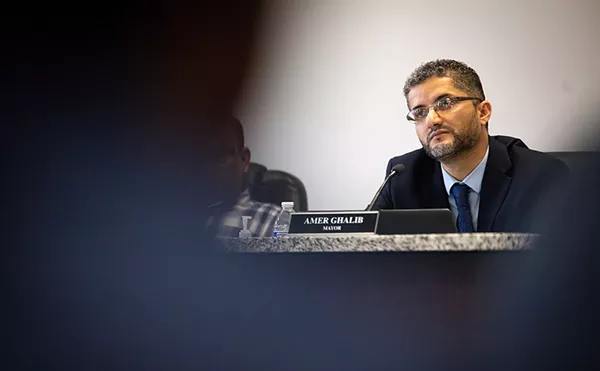News Hits: Council tells Orr to leave ... soon

Audio By Carbonatix
[
{
"name": "GPT - Leaderboard - Inline - Content",
"component": "35519556",
"insertPoint": "5th",
"startingPoint": "3",
"requiredCountToDisplay": "3",
"maxInsertions": 100,
"adList": [
{
"adPreset": "LeaderboardInline"
}
]
}
]
Last week brought a close to Emergency Manager Kevyn Orr’s reign in Detroit … sort of.
Following days of deliberation behind closed doors in private sessions, and weeks of speculation that included Orr transferring powers to Mayor Mike Duggan, Detroit City Council voted to keep Orr in place until Detroit exits bankruptcy.
Orr, however, will cede full control of the city’s day-to-day operations, according to a joint statement issued by Duggan and the council. The mood, expectedly, was upbeat.
“As the City approaches the end of its historic bankruptcy proceedings, it is absolutely imperative that the next steps continue to move the city towards an expedient emergence from bankruptcy,” the statement says. The move would take place “effective immediately,” under an order issued by Orr.
Duggan will send a letter to Republican Gov. Rick Snyder, who appointed Orr in March 2013, to sign off on the council’s resolution. The decision to keep Orr in some capacity likely was a conflicting resolution for new councilmembers and Duggan, who campaigned on removing the emergency manager from office as soon as possible.
Under Michigan’s novel emergency manager law, PA 436 of 2012, that could have taken place as early as last weekend.
The resolution approved by council will allow Orr to remain in place “solely for the purpose of executing documents and overseeing litigation related to the bankruptcy proceedings,” the statement says.
Similarly, Orr’s order says he would not “exercise his powers under PA 436 to interfere with the powers restored to the Mayor and Council.” Michigan’s EM law allows City Council to vote Orr out, with Duggan’s approval, by a two-thirds vote. But Orr ushered Detroit into its historic bankruptcy — and, as Duggan and the council put it, they need him to see the case through its conclusion.
Not to be the total doom-and-gloom naysayers in the room, but the Hits crew couldn’t help but wonder how excited Detroit’s elected officials really felt.
First off, Orr, who earns a $275,000 salary per year under his contract as Detroit’s state-appointed emergency manager, will play a role to enact agreements in the bankruptcy until it’s confirmed by U.S Bankruptcy Judge Steven Rhodes. As most observers note, that could take weeks, if not months.
And, if Rhodes agrees that the bankruptcy-exit plan submitted by Orr is feasible and legal under federal bankruptcy code, additional oversight for Detroit has been spelled out under state legislation approved earlier this year, which authorizes the use of $195 million toward the Detroit Institute of Arts (DIA) settlement.
Better known as the “grand bargain,” the settlement also calls for a $450 million in money from private foundations and the DIA to shore up Detroit’s pension funds and salvage the museum’s artwork from being slung in a fire sale. The legislation also establishes the Financial Review Commission (FRC), which will weigh in on a number of Detroit’s fiscal matters.
So, in other words, Duggan and City Council may be in the driver's seat, but the nine-member commission, seven of whom would be state appointees, would backseat-drive for at least 13 years after Detroit’s plan to exit bankruptcy is confirmed.
As Metro Times previously reported, the oversight commission would have the power to, among other things, review and approve the city’s four-year financial plan, approve or reject all contracts for goods and services worth at least $750,000, and review requests by the city to issue debt.
The city’s nine-member Financial Advisory Board (FAB), appointed in mid-2012 as part of the city’s former consent agreement to implement cost-cutting measures, will be dissolved and replaced by the FRC.






